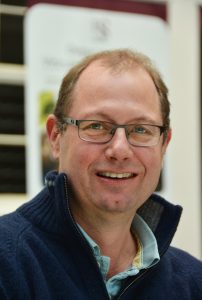Keynote
Making Sense of Wine – a Sensory Data Approach
Florian F. Bauer
Institute for Wine Biotechnology, Department of Viticulture and Oenology, Stellenbosch University
Keynote: Tuesday, March 12 at 09:30 in the STIAS Manor House
“A poet once said, “The whole universe is in a glass of wine.” We will probably never know in what sense he meant that, for poets do not write to be understood. But it is true that if we look at a glass of wine closely enough we see the entire universe” (Richard Feynman).
Wine is fundamentally different from almost all other food items: A product with a story to tell, and defined more by its continuously changing nature and sensorial complexity than by conformation to an ideal or prototype. No other food product has been analysed and described to the same degree, creating a public image that plays on associations with food, luxurious lifestyle and mystery. Nevertheless, the global industry has to adapt to the changing attitudes and demands of markets both regional and global. The scientific question to answer: Can we better understand what makes and defines a good wine? In this context, and not always appreciated by the guardians of traditional wine values, the definition of “good” is what is liked by consumers.
So what, in the mind of a person, makes a fermented beverage a wine, and what makes a wine a good wine? To answer these questions, wine science for many decades has investigated the impact of viticulture and oenological practices on the chemical composition of wine, and attempted to correlate chemical profiles with sensory perception. Those data have generated an impressive body of knowledge, and certainly improved the average quality of wines produced globally, but the mystery of the nature and complexity of the product remains: No chemical profile or in-depth chemical analysis predicts the perceived quality of a wine. Why? The answer may well be “it’s all in the mind” – there simply may be no chemical quality signature. But new sensory and data mining approaches have recently emerged attempting to address those questions taking perception and the consumer as a starting point. Sensory data however are notoriously complex and difficult to analyse and interpret, and data-mining approaches face challenges due to the absence of coherent and structured sets of wine sensory data. So data science has come to the rescue. This talk will present examples of how such approaches provide new perspectives on the question of what makes a wine a wine, and perhaps even a typical or a “good” one at that.
Biography Prof. Florian F. Bauer

Prof. Florian F. Bauer
Born in Germany, Prof. Florian F. Bauer pursued his tertiary education in France and obtained a Ph.D. (Life Sciences) at the University of Bordeaux II in 1992. His current position is Professor in Wine Biotechnology and South African Research Chair in Integrated Wine Science, based at the Institute for Wine Biotechnology, Department of Viticulture and Oenology, University of Stellenbosch. His research focuses on wine-relevant aspects of yeast physiology, genetics and molecular biology, including the genetic and metabolic regulatory networks that control metabolism, cell wall properties and biotic stresses due to interactions between wine microorganisms. More recently, the focus has shifted towards investigating the dynamics of wine-associated microbial ecosystems, synthetic ecology and the integration of new data analysis tools. Research data have been published in more than 90 peer-reviewed articles, many book chapters and popular articles. He has been invited to present numerous keynote, opening or plenary lectures at international and national conferences, and twenty-three Ph.D. and thirty-six M.Sc. students have graduated under his supervision.